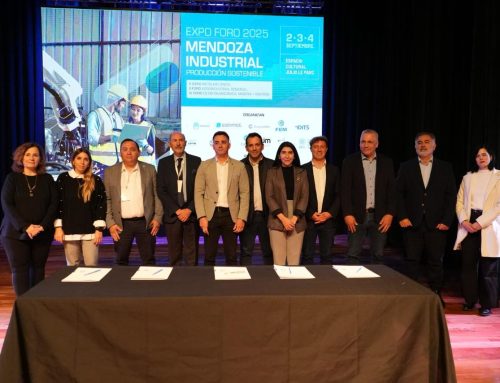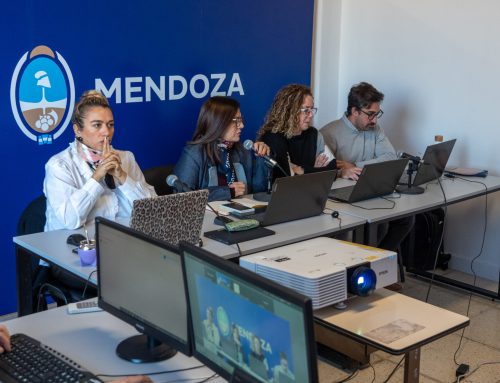The copper project has adapted to current provincial legislation and the latest international mining standards. In addition, technological advances have been incorporated into production processes, enabling operations to become more efficient and aligned with the energy transition goals to address global climate change. As of today, the corresponding procedure has been initiated before the competent Provincial Authority.
Details
PSJ Cobre Mendocino, the project dedicated to copper prospecting, exploration, and mining development in Las Heras, Mendoza, has submitted an important adaptation of its Environmental Impact Report (EIR), incorporating the latest international standards in sustainability and best practices in the mining industry. This process includes the implementation of advanced technologies in production methods, ensuring a more efficient and environmentally responsible operation, aligned with the Project’s commitment to sustainable development and respect for the community and the environment.
“Our commitment is to be an example of responsible mining in Argentina. The incorporation of new technologies and alignment with global best practices are fundamental steps to fulfill our vision of working together with the community, fostering the region’s integral development, and contributing to the objectives of the energy transition,” PSJ representatives highlighted. They added: “We believe the conditions are in place for Mendoza to become one of the first copper-producing provinces in Argentina.”
To date, the Project, which is part of the Copper Roundtable (Mesa del Cobre), has invested USD 62 million in exploration drilling and various engineering studies, and is one of the few projects in Argentina with 13 years of environmental baseline data.
PSJ will also be the first mining project in Mendoza to join the Regime of Incentives for Large Investments (RIGI). This regime offers fiscal, customs, and exchange stability, facilitates the import of capital goods, provides export incentives, simplifies administrative procedures, ensures intellectual property protection, grants access to preferential financing, and includes an efficient and direct dispute resolution mechanism. These conditions provide a favorable environment for long-term mining projects, consolidating PSJ Cobre Mendocino as a key initiative for the sustainable economic development of Mendoza.
In addition, it was announced that the controlling company of the Project currently belongs to Zonda Metals GmbH of Switzerland, which specializes in the search and development of copper projects worldwide, and Grupo Alberdi of Argentina, with more than 120 years of investment in the country across sectors such as mining, industry, real estate, and energy. It is worth noting that Grupo Alberdi has also been investing in Mendoza’s mining sector for some time, through the “Cerro Amarillo” Project located in Malargüe.
The Project has an estimated initial investment of USD 559 million. Following the approval of the Environmental Impact Statement (EIS), an immediate investment of USD 15 million will be made within the first 12 months.
The construction period will range between 18 and 24 months. The initial estimated life of the mine is 16 years, with the possibility of extending to 27 years, not including additional drilling that may be carried out to further expand its lifespan.
“Production will be carried out through a conventional flotation mechanical reduction process. The substances or reagents used in the flotation process will comply with current provincial regulations,” the company explained.
PSJ has received support from leading national and international consulting firms specializing in technical, environmental, and social areas. Among them are Vector Argentina, SGS Chile, JKTech Pty Ltd, SRK Consulting, RPM Global, Water Management Consultants, GT Ingeniería S.A., Anddes Argentina, SIEyE, Lucero, Artois Consulting, Monkey Forest Consulting, and UNSL, who contributed to environmental, hydrogeological, geotechnical, hydrological balance, and infrastructure design studies. These collaborations ensure that the Project meets the highest standards of sustainability and responsible mining.
Value chain
From a socio-economic perspective, PSJ is expected to make a significant contribution to the growth of commercial activities in Uspallata, Las Heras, and Mendoza, mainly through staff training, employment, and the new flow of goods and services to be developed in the region.
PSJ Cobre Mendocino will significantly contribute to the region’s economic development, creating approximately 3,900 jobs during the construction phase and 2,400 during the operational phase (800 direct and 1,600 indirect).
To maximize local participation, the Project will implement a training and education program in Uspallata, allowing the community to directly benefit from the jobs created by PSJ and enabling local residents to access employment opportunities within the mine and processing plant.
The development of the regional value chain is another cornerstone of the Project. In addition to the direct and indirect jobs generated by PSJ, new jobs will also arise from the expansion and strengthening of a supplier network providing both basic and complex services, which will boost the productive fabric of the area.
Among complex service providers are those in fields such as engineering, construction, metalworking, equipment maintenance, spare parts and machinery, electromechanics, and professional services. These sectors will not only generate specialized employment but also attract investments and improve local infrastructure.
Basic service providers will cover essential needs for the Project’s development and improve the region’s quality of life. This includes sectors such as basic supplies, laundry, cleaning, hospitality, gastronomy, and transportation. These providers will play a crucial role in the Project’s logistical and operational support, boosting the local economy and creating new employment opportunities for the community.
The benefits of PSJ Cobre Mendocino will not be limited to the direct and indirect employment generated by the mine but will also extend to the entire region through the strengthening of the value chain, improving local infrastructure, and diversifying economic opportunities.
Copper for the energy transition
Copper is indispensable for the functioning of modern infrastructure and the technology we use daily, such as mobile phones, computers, and other electronic devices. It is also vital for the development of sustainable technologies that contribute to reducing emissions and promoting renewable energy.
The company emphasized: “Copper is a key resource for the global energy transition, as its high conductivity makes it an essential material for clean technologies such as solar panels, wind turbines, electric vehicles, and energy storage systems. In this context, PSJ positions itself as a strategic project contributing to the responsible supply of this essential metal.”






